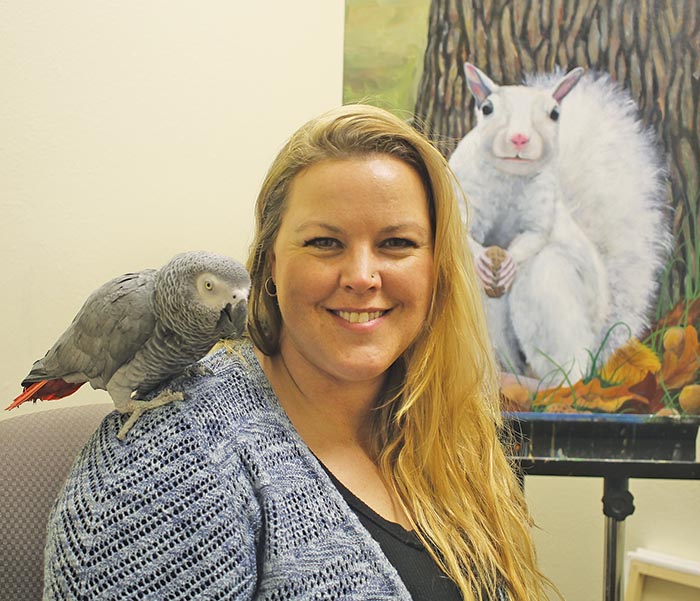Yes, Polly does want a cracker
News | Published on March 31, 2021 at 4:04pm EDT | Author: Chad Koenen
0Local resident helps birds find forever homes
By Barbie Porter
Editor
Shelters for traditional pets like cats and dogs are well known in the area for helping animals find forever homes. Rural Detroit Lakes resident Anna Lassonde is a member of a more unique pet rescue that focuses solely on birds.
The business owner of Jollybird Studio, which creates commissioned art and sells original pieces, provides home studies for those wanting to adopt a bird from the Center for Avian Adoption, Rescue, and Education—Parrot Shelter in Fargo, N.D.
“Basically, I make sure it is a good home for a bird,” Lassonde said. “I also provide education to owners about what is toxic to birds. For example, there are certain plants and foods, like an avocado, that can kill a bird. Or, even Teflon cookware. It produces fumes that actually kill parrots.”

Lassonde grew up with restrictions on what pets she could own. Birds were on the short list, so she began her journey as a lifelong bird owner when she was about 8 years old.
“Birds have always been fun,” she said. “They are very easy, low-maintenance pets, and as a kid having a bird taught me about responsibility.”
Her journey started with parakeets and cockatiels, both smaller birds. There are many varieties of parakeets and life expectancy ranges from 5-30 years, whereas the cockatiels can live up to 25 years in captivity.
“I’ve always wanted a big parrot,” Lassonde said. “That was a big learning curve when I got one. One thing I learned was the smaller birds eat bird seed, whereas larger birds eat pellets, fruits, vegetables, and yes, it turns out Polly does want a cracker.”
The smaller birds may have a length of 14 inches whereas a parrot, which can live up to 80 years, may have a length of 3 feet or more. Being a larger bird also means they have a more powerful beak.
“Their beak was intimidating, but I decided to accept the fact that I was going to get bit,” she said. “Over time I learned to watch their body language and bond with them to build a relationship of trust.”
Some may question how a bird’s brain could have thoughts of trust, and may think a bird’s actions are focused on basic needs of survival. Lassonde explained that is a far cry from the truth.
“Some birds have an intelligence that is similar to dogs,” she said. “They can learn words, different languages, colors, shapes and commands. My bird, Theo, after I got him, asked me for a drink of water in Spanish. I gave it to him and he drank. To have that thought of being thirsty, asking for water and then drinking shows the ability to have a thought process and express it.”
She explained the birds that are surrendered to the center come from many different backgrounds. Some lost a human mate, others were not properly cared for and eventually the owner recognized the pet was not for them.
“It is great to adopt instead of shop,” Lassonde said. “Also, another great thing about adopting a bird from the shelter is we will match a bird to your personality and lifestyle. There is also a 30-day policy that says they will take the bird back if it doesn’t work out.”
Candi Willey, vice president of the Center for Avian Adoption, Rescue, and Education – Parrot Shelter said a local bird club saw a need for a bird-based shelter and rescue in 2000. She joined in 2004.
The Fargo resident estimated annually the shelter sees 100 birds come through the doors. While a few are returned, as a potential bird owner decided the pet wasn’t a good fit, most find forever homes.
“We have finches, which is a smaller bird, to the larger species like cockatoos and macaws,” Willey said. “The type of birds we get seem to go in spurts. We might see an stretch of African greys, then a stretch of macaws.”
She said with the pandemic they saw more interest in adoption. Those that inquired were given a crash course on birds, from the different diets to cleaning cages to the minimum amount of time a bird needs to spend with its human.
“Some birds can also get really loud, upwards of 135 to 140 decibels, which is more than a jet engine,” Willey said. “When someone is looking for a bird we want to make sure they find the right one, so there aren’t many surprises.”
As far as healthcare needs, Willey said there are instances where a bird needs to see a vet. Health checks are also recommended every two years, unless there are health issues. Willey noted another perk from adopting a bird from the shelter is knowing what the bird’s health needs are.
“We also offer memberships to those that adopt,” Willey said. “Memberships get 15 percent off with our store where they can buy food, toys, cages, and more. We also have in store services for grooming and boarding.”
Willey said the grooming may include clipping wings, as some owners take their birds outside with them.
“The additional services, along with the adoption fees, helps pay rent and keep the shelter going,” she said, noting bird adoption fees range from $5 (for smaller birds) to $500.”
Willey encouraged anyone interested in discussion potential adoption of a bird to call the Center for Avian Adoption, Rescue, and Education – Parrot Shelter (701) 293-3833. The shelter is run on volunteer hours, and people can meet the birds by appointment. She added bird enthusiasts looking to volunteer can also call the same number.

